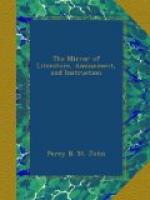The list of operas recently performed in New York might put our patent theatres a little to the blush, at least on the score of variety. Rokeby; the Tempest; John of Paris; the Barber of Seville; the Caliph of Bagdad, performed, and the Freischuetz in preparation, at one theatre. The principal female singers are all English—Mrs. Austin, Mrs. Knight (formerly Miss Povey), and Madame Feron. The American editor’s remarks on the two last named ladies, and on ballad singing in general, are so much in accordance with our own opinions, except the praise he bestows on Madame Feron’s execution, that we cannot resist the temptation of extracting them.
“Mrs. Knight’s worst ballads, aided by a drum beaten by Mr. Knight, seem to please the audience better than Mad. Feron’s bravuras; indeed, we think the manager would gain more by the adoption of Mrs. K. than Madame F. We have remarked a listlessness on the part of Madame F., doubtlessly in consequence of feeling that her best efforts are not appreciated by the audience. We are not an ardent admirer of that lady’s style: she has evidently studied to surmount difficulties, without sufficiently paying attention to the groundwork of singing; she fills you with admiration at the execution of a tremendous passage, and then disappoints you by singing a few sustained notes in a tremulous, uncertain manner. In making the above observations on ballads, let us not be supposed to throw discredit upon that style of composition. ‘Robin Gray,’ ‘Oh no we never mention her,’ ‘The Soldier’s Tear,’ and such compositions, are a description of ballads, of which, with the Irish, Scotch, and Welsh melodies, we are proud; but if we admit that the drum and fife compositions of Mr. Lee and others, such as ‘Bonnets of blue,’ ‘Blue bonnets,’ ‘Charley’s over the water,’ and ‘Over the water to Charley,’ are other than trash, fit only to amuse the gentlemen and ladies of colour in the gallery, we should be unworthy to be editor of the ‘Euterpeiad.’”
Harmonicon.—No. 1.
[11] There are thirty-two
Italian operas by Handel, in MS. in his
Majesty’s
collection, and he composed eleven others—making
forty-three
in all.—( Editor of Harmonicon.)
[12] How many more might the
American writer have added to this
solitary
one, had his list of Handel’s Italian songs been
at
hand.
This great German composer was nearly as well
acquainted
with the Italian language as with his own, and
often
not only wrote letters in it, but employed it in many
of
his private memorandums.—(Ib.)
* * * * *




